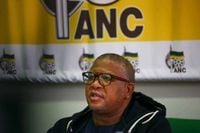A fiery ANC caucus meeting has exposed deep divisions over the party’s alliance with the DA in the Government of National Unity (GNU), with over 100 MPs demanding an immediate breakup, according to Sunday Times sources.
Frustrated ANC legislators confronted Secretary-General Fikile Mbalula at a tense Johannesburg meeting, slamming the DA’s repeated challenges to key policies—including the budget and employment equity laws—as proof of bad faith.
President Cyril Ramaphosa stated that the DA had “defined itself out of the GNU” by rejecting two budget versions. One insider fumed: “They take NHI to court, fight Bela, block the budget, what more proof do leaders need? We want them out!”
The meeting turned chaotic when Deputy President Paul Mashatile and ANC chair Gwede Mantashe blasted Mbalula for arriving an hour late. A source revealed: “Mantashe told him, ‘You’re exactly an hour late, SG.’ He later walked out mid-speech.”
The DA’s court bid to overturn the Employment Equity Amendment Act was the final straw. “Challenging the employment act proves we can’t work with them,” an MP said.
ANC spokesperson Mahlengi Bhengu-Motsiri confirmed the meeting but refused to discuss “leaks.” Meanwhile, the 159-member caucus—packed with NEC and Cabinet figures—could force the DA’s GNU exit.
With the budget vote looming on May 21, the ANC must decide: stick with the DA or pivot to smaller parties? One thing is clear—the GNU’s future hangs by a thread.
The meeting became tense when ANC MPs brought up the DA’s refusal to back the previous versions of the budget. ANC Secretary-General Fikile Mbalula reportedly called the meeting to discuss the new budget that will be presented in parliament on May 21.
ANC MPs urged the party’s leadership to remove the DA from the government of national unity (GNU). The MPs cited the DA’s recent court challenge against the Employment Equity Amendment Act and its previous opposition to the National Health Insurance (NHI) and Basic Education Law Amendment (Bela) Act.
“Going to the courts to challenge the employment act is further proof that we cannot be in this coalition,” a source told the Sunday Times. “We told the SG that this is the party that continues to undermine the government, and it has done nothing to show that they are willing to work with us.”
Another MP expressed concern, stating, “They will cost us a lot, and the leadership needs to take a decision very fast. At the moment, the leadership is treating the DA with kid gloves.”
The Sunday Times reported that Deputy President Paul Mashatile and ANC national chair Gwede Mantashe berated Mbalula for arriving an hour late to the meeting. Mantashe even left the meeting while Mbalula was speaking.
“The chief whip [Mdumiseni Ntuli] had to deliver the report on the budget process, which was supposed to be delivered by the SG,” the source said. “That irritated the chairperson, the deputy president and the caucus. Mbalula arrived late, and it signalled to us that he has no respect for our time.”
This is not the first time Mbalula has angered party leaders recently. In April, it was reported that senior ANC leaders were upset after Mbalula set up a secret team to negotiate the budget with the DA. Mantashe was said to be “livid,” while ANC chief whip Mdumiseni Ntuli accused Mbalula’s team of “undermining” his official negotiating team.
As tensions mount, the ANC faces a pivotal moment. With the looming budget vote on May 21, the party must navigate its future direction carefully. The call to remove the DA from the GNU is gaining momentum among MPs, who are increasingly frustrated with the coalition's dynamics.
In light of the DA's ongoing legal challenges and refusal to support crucial budget proposals, many ANC members feel that the coalition is no longer tenable. The sentiment among the MPs reflects a broader concern that the DA's actions could jeopardize the ANC's standing and effectiveness in governance.
As the meeting concluded, the atmosphere was charged with urgency. The ANC leadership faces pressure not only from within its ranks but also from the electorate, who are keenly observing how the party handles this internal strife. The next steps will be crucial in determining the future of the GNU.
With calls to partner with smaller parties gaining traction, the ANC may be looking to reshape its alliances in a way that could stabilize the party and restore confidence among its supporters. The potential shift could lead to a significant reconfiguration of the political landscape in South Africa.
As the date for the budget vote approaches, the ANC must weigh its options carefully. The decisions made in the coming days could have lasting implications for the party and its role within the broader coalition government.
One thing remains clear: the ANC's leadership is at a crossroads, and the path they choose will resonate throughout the political arena.

